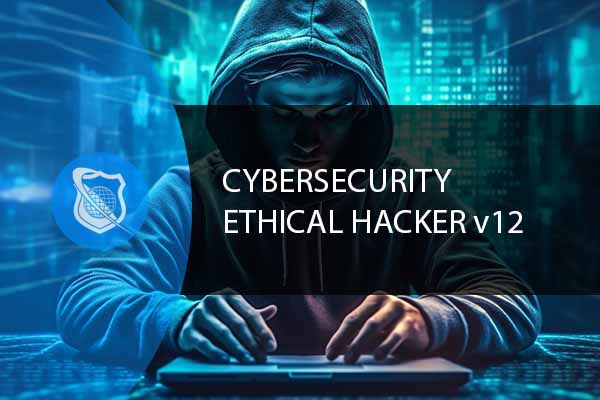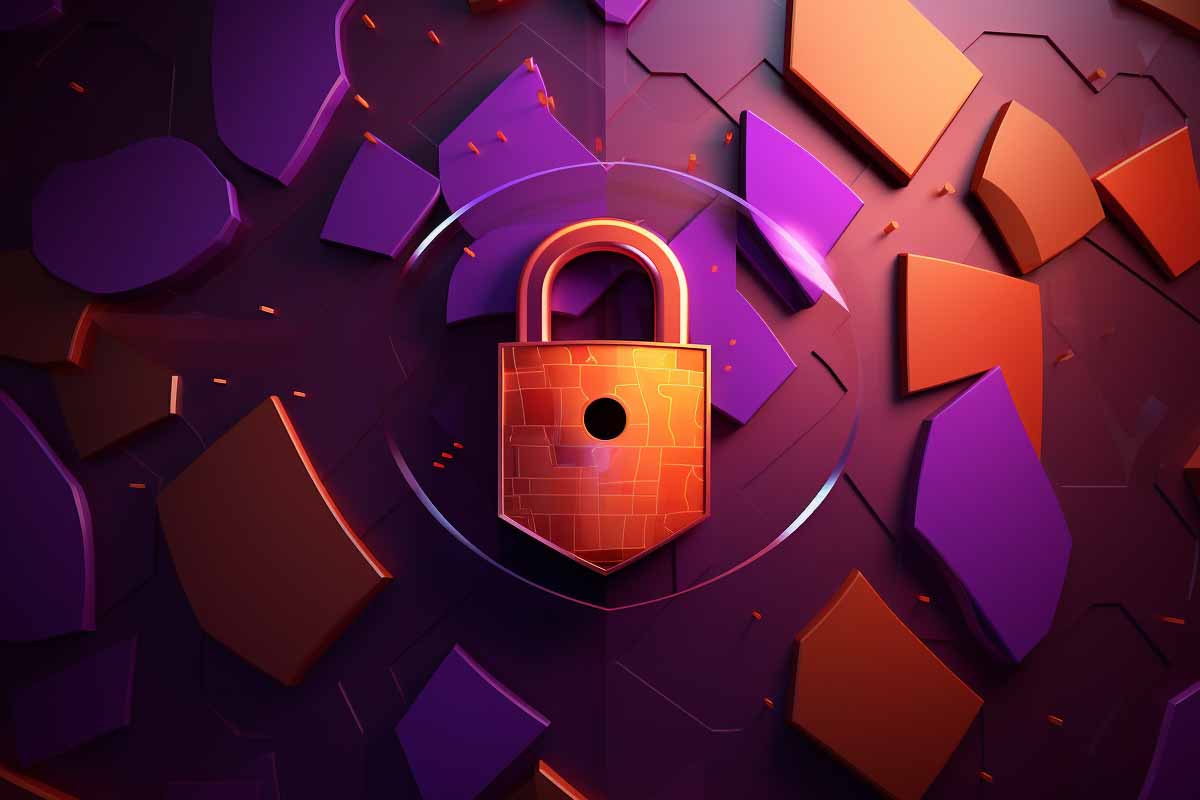The importance of Cybersecurity Certifications is paramount. As we become more interconnected through the internet, the risks associated with cyber threats grow exponentially. Gone are the days when simple firewalls and antivirus software were enough to protect your systems. Cybercriminals are becoming increasingly sophisticated, employing advanced techniques to breach security measures. In this high-stakes environment, having a certificate in computer security is not just an asset—it’s an absolute necessity for anyone serious about safeguarding digital assets.
So, if you’re still on the fence about whether or not to pursue this certification, read on. By the end of this article, you’ll have a comprehensive understanding of why a Computer Security Certificate is not just beneficial but essential in today’s cybersecurity landscape.

Cybersecurity Ethical Hacker
Ready to become an unstoppable force in cybersecurity? Our Certified Ethical Hacker V12 course is your gateway to mastering the art of ethical hacking. Dive deep into vulnerability analysis, target scanning, and stealthy network penetration. With hands-on activities and expert insights, you’ll learn to break into target networks, gather evidence, and exit without a trace. Don’t just learn to hack—learn to hack like a pro!
Top Ten Reasons
Cybersecurity certifications have become increasingly essential in today’s digital landscape for a myriad of reasons. They not only validate an individual’s skills and knowledge in cybersecurity but also address the evolving challenges of securing information systems against cyber threats. Here are ten reasons why cybersecurity certifications are necessary today:
- Addressing the Skills Gap: With a growing cyber threat landscape, there’s a significant skills gap in the cybersecurity workforce. Certifications provide a structured path for individuals to gain the necessary expertise and help fill this gap.
- Enhancing Credibility: Professionals holding cybersecurity certifications are often seen as more credible and reliable. These certifications demonstrate a proven level of expertise and commitment to the field.
- Meeting Compliance Requirements: Many industries require businesses to adhere to strict cybersecurity standards and regulations. Having certified professionals ensures that companies meet these compliance requirements, avoiding potential legal and financial penalties.
- Improving Job Prospects: Cybersecurity certifications can significantly enhance job prospects. They often serve as a prerequisite for many roles, helping individuals stand out in the job market and advance their careers.
- Keeping Pace with Evolving Threats: The cybersecurity landscape is constantly evolving, with new threats emerging regularly. Certifications require ongoing education and recertification, ensuring professionals stay up-to-date with the latest threats and defense mechanisms.
- Building a Standardized Knowledge Base: Certifications provide a standardized body of knowledge, ensuring that professionals across the globe have a consistent understanding of cybersecurity principles, tools, and practices.
- Enhancing Team Confidence and Trust: In organizations, certified cybersecurity professionals boost the confidence of management and stakeholders. This trust is crucial for implementing effective security strategies and policies.
- Facilitating Industry Networking: Earning a cybersecurity certification often involves joining a community of certified professionals. This network can be invaluable for sharing knowledge, finding mentors, and discovering new career opportunities.
- Increasing Efficiency: Certified professionals are trained to recognize and mitigate threats more efficiently. This proficiency can save organizations time and resources by preventing or quickly responding to security incidents.
- Supporting Professional Development: Pursuing cybersecurity certifications encourages professionals to continuously learn and grow. This ongoing development is critical for staying effective in a field characterized by rapid technological changes and sophisticated cyber threats.
Cybersecurity certifications are more than just credentials; they are essential tools that equip individuals and organizations to navigate the complexities of modern cybersecurity, ensuring the protection of sensitive data and systems against increasingly sophisticated cyber threats.
A Deeper Dive Into The Reasons
let’s delve into each reason with more detailed explanations and the role of associated LSI keywords in emphasizing the significance of these certifications.
1. Addressing the Skills Gap
Importance: The cybersecurity field is rapidly expanding, leading to a significant skills gap. Certifications like CompTIA Security+, CISSP, and CEH offer structured learning paths that cover foundational to advanced cybersecurity principles, helping to equip the workforce with necessary skills. Role in Certification: These programs validate knowledge and skills in areas such as threat intelligence, network security, and incident response, ensuring that professionals are prepared to meet the demands of the industry.
2. Enhancing Credibility
Importance: In a field as critical as cybersecurity, credibility is paramount. Holding certifications such as CISM or GSEC signals to employers, colleagues, and clients that an individual has met a recognized standard of expertise and ethical practice. Role in Certification: This endorsement strengthens professional reputation, opening doors to career advancement and greater responsibilities in cybersecurity roles.
3. Meeting Compliance Requirements
Importance: Regulatory frameworks like GDPR, HIPAA, and PCI DSS outline strict cybersecurity standards. Certifications ensure professionals are well-versed in these standards, helping organizations comply and avoid penalties. Role in Certification: Through certifications, professionals gain knowledge in compliance and standards, making them invaluable to organizations needing to navigate these regulations.
4. Improving Job Prospects
Importance: Cybersecurity certifications can be a key differentiator in the job market. They often serve as a minimum requirement for high-paying roles in cybersecurity analysis, ethical hacking, and security management. Role in Certification: By achieving certifications, individuals demonstrate commitment and proficiency to potential employers, significantly enhancing their employability and career trajectory.
5. Keeping Pace with Evolving Threats
Importance: The cyber threat landscape changes rapidly. Certifications require continuous education, ensuring that professionals stay updated on the latest cyber threats and defense mechanisms. Role in Certification: Recertification and continuing education credits associated with certifications like CISSP and CEH ensure professionals maintain a current understanding of cybersecurity trends and technologies.
6. Building a Standardized Knowledge Base
Importance: Cybersecurity certifications establish a common language and knowledge base across the industry, crucial for effective communication and collaboration among professionals. Role in Certification: These programs cover a comprehensive curriculum, including secure coding practices, encryption techniques, and vulnerability assessment, ensuring a standardized understanding of cybersecurity fundamentals.
7. Enhancing Team Confidence and Trust
Importance: Certified professionals instill confidence among team members, management, and stakeholders. This trust is essential for the successful implementation of security strategies and policies. Role in Certification: The rigorous process of earning cybersecurity certifications demonstrates an individual’s dedication and capability, fostering trust and confidence in their skills.
8. Facilitating Industry Networking
Importance: Many certification programs offer access to a community of cybersecurity professionals. This network is invaluable for career development, mentorship, and staying informed about industry trends. Role in Certification: Engaging with this community through forums, conferences, and workshops provides opportunities for professional growth and collaboration.
9. Increasing Efficiency
Importance: Certified cybersecurity professionals possess the skills to efficiently identify and mitigate threats, saving organizations time and resources by preventing or quickly responding to incidents. Role in Certification: Training and certification in areas like incident response and risk management equip professionals with the ability to act swiftly and effectively, minimizing the impact of security breaches.
10. Supporting Professional Development
Importance: The field of cybersecurity is characterized by constant evolution. Certifications encourage ongoing learning and skill development, keeping professionals at the forefront of the field. Role in Certification: The pursuit of advanced certifications, such as those focusing on cloud security, AI in cybersecurity, and IoT security challenges, drives continuous professional growth and adaptation to new technologies and threats.
Cybersecurity certifications play a pivotal role in shaping a skilled, credible, and prepared workforce capable of addressing the complex challenges of today’s cybersecurity landscape. They are essential not just for individual career advancement but also for the overall strengthening of organizational and global cyber resilience.
Top 10 Computer Security Certificates in 2023
| Rank | Certification Name | Focus | Job Opportunities | Requirements | Cost |
|---|---|---|---|---|---|
| 1 | Certified Information Systems Security Professional (CISSP) | Advanced IT security, cybersecurity program design, and implementation | Chief information security officer, Security administrator, IT security engineer | Five years of work experience in cybersecurity domains | $749 |
| 2 | Certified Information Systems Auditor (CISA) | Security vulnerabilities assessment, controls implementation, and compliance reporting | IT audit manager, Cybersecurity auditor, Information security analyst | Five years of experience in IT or IS audit, control, security, or assurance | $575 for members, $760 for non-members |
| 3 | Certified Information Security Manager (CISM) | Management side of information security | IT manager, Information systems security officer, Information risk consultant | Five years of experience in information security management | $575 for members, $760 for non-members |
| 4 | CompTIA Security+ | Core skills in cybersecurity | Systems administrator, Help desk manager, Security engineer | Recommended two years of IT experience with a security focus | $370 |
| 5 | Certified Ethical Hacker (CEH) | Ethical hacking, penetration testing | Penetration tester, Cyber incident analyst, Threat intelligence analyst | Two years of work experience in information security or completion of official EC-Council training | $950 to $1,199 |
| 6 | GIAC Security Essentials Certification (GSEC) | Entry-level security credential | IT security manager, Computer forensic analyst, Penetration tester | No specific requirements | $2,499 |
| 7 | Systems Security Certified Practitioner (SSCP) | Design, implementation, and monitoring of a secure IT infrastructure | Network security engineer, System administrator, Systems engineer | One year of paid work experience in testing areas | $249 |
| 8 | CompTIA Advanced Security Practitioner (CASP+) | Advanced topics in cybersecurity | Security architect, Security engineer, Application security engineer | Recommended ten years of IT administration experience | $466 |
| 9 | GIAC Certified Incident Handler (GCIH) | Incident handling, computer crime investigation | Security incident handler, Security architect, System administrator | No formal prerequisites | $2,499 |
| 10 | Offensive Security Certified Professional (OSCP) | Penetration testing | Penetration tester, Ethical hacker, Threat researcher | No formal requirements | From $999 |

Lock In Our Lowest Price Ever For Only $14.99 Monthly Access
Your career in information technology last for years. Technology changes rapidly. An ITU Online IT Training subscription offers you flexible and affordable IT training. With our IT training at your fingertips, your career opportunities are never ending as you grow your skills.
Plus, start today and get 10 free days with no obligation.
Conclusion
From certified cyber security training to what is the best cyber security certification, the options are endless. However, a Computer Security Certificate stands out for its comprehensive coverage and global recognition. Whether you’re looking at security certifications for companies or individual growth, this certification should be at the top of your list.
So, if you’re pondering which cybersecurity certification should I get first or looking at the list of cyber security certifications, make sure a Computer Security Certificate is on your radar. With the projected growth in cyber security certifications 2023 and beyond, now is the perfect time to invest in your future [1].
Remember, in the world of cybersecurity, a certificate is not just an option; it’s a necessity. So, take the plunge and get certified today!
You may also like:
- Ethical Hacking Careers: Your Path to Cybersecurity Success
- Why Read: This blog delves into the various career paths available in ethical hacking, a subset of cybersecurity. It’s a great read for those considering a Computer Security Certificate as a stepping stone to a career in ethical hacking.
- Device Hacking Website: Unveiling the Tactics of Cybercriminals
- Why Read: This blog offers insights into the tactics used by cybercriminals to hack devices. Understanding these tactics can enhance your skills, especially if you have a Computer Security Certificate.
- Hackers App: A Beginner’s Guide to Understanding Its Mechanics
- Why Read: This blog provides a beginner-friendly guide to understanding hacker apps and how they work. It complements the knowledge you’d gain from a Computer Security Certificate.
- Certified Pen Tester: How to Ace the Certification Exam
- Why Read: If you’re considering taking the Certified Penetration Tester exam, this blog provides valuable tips. It’s particularly useful if you already have a Computer Security Certificate and are looking to expand your certifications.
Key Term Knowledge Base: Key Terms Related to Computer Security and Certifications
Understanding key terms in computer security and certifications is crucial for professionals and enthusiasts alike. It equips them with the necessary vocabulary to navigate the complex landscape of cybersecurity, understand threats and defenses, and engage with technical materials and discussions effectively. Here’s a list of foundational terms and concepts that are essential in this domain.
| Term | Definition |
|---|---|
| Cybersecurity | The practice of protecting systems, networks, and programs from digital attacks. |
| Encryption | The process of converting information or data into a code, especially to prevent unauthorized access. |
| Firewall | A network security device that monitors and filters incoming and outgoing network traffic based on an organization’s previously established security policies. |
| Malware | Malicious software designed to harm, exploit, or otherwise illegally access a computer system without the owner’s informed consent. |
| Phishing | A cyber attack that uses disguised email as a weapon. The goal is to trick the email recipient into believing that the message is something they want or need and then clicking a link or downloading an attachment. |
| VPN (Virtual Private Network) | A service that encrypts your internet traffic and protects your online identity by hiding your IP address. |
| SSL/TLS (Secure Sockets Layer/Transport Layer Security) | Protocols for establishing authenticated and encrypted links between networked computers. |
| Authentication | The process of verifying the identity of a user or device. |
| Authorization | The process of granting or denying access to resources. |
| DDOS Attack (Distributed Denial of Service) | An attack aimed at disrupting the normal traffic of a targeted server, service, or network by overwhelming the target or its surrounding infrastructure with a flood of Internet traffic. |
| Penetration Testing | A simulated cyber attack against your computer system to check for exploitable vulnerabilities. |
| Ransomware | A type of malicious software designed to block access to a computer system until a sum of money is paid. |
| Social Engineering | The use of deception to manipulate individuals into divulging confidential or personal information that may be used for fraudulent purposes. |
| Cryptography | The practice and study of techniques for secure communication in the presence of third parties. |
| Intrusion Detection System (IDS) | A device or software application that monitors a network or systems for malicious activity or policy violations. |
| Security Certificate | A digital certificate that encrypts data between a web browser and a server, ensuring secure transactions. |
| Compliance | Adherence to laws, regulations, guidelines, and specifications relevant to its business processes. |
| Threat Intelligence | Evidence-based knowledge, including context, mechanisms, indicators, implications, and actionable advice, about an existing or emerging menace or hazard to assets. |
| Vulnerability Assessment | The process of identifying, quantifying, and prioritizing (or ranking) the vulnerabilities in a system. |
| Incident Response | The methodology an organization uses to respond to and manage a cyberattack or data breach. |
| Zero-Day Exploit | A cyber attack that occurs on the same day a weakness is discovered in software. At that point, it’s exploited before a fix becomes available from its creator. |
This list encompasses a broad spectrum of concepts that are foundational to understanding and working within the realm of computer security and certifications. Each term is a building block for deeper exploration and comprehension of the subject.
Frequently Asked Questions Related to Cybersecurity Certification Reasons
Why are cybersecurity certifications important for career development in IT?
Cybersecurity certifications are crucial for career development as they validate an individual’s skills and knowledge in cybersecurity, setting them apart in the job market. These certifications serve as a benchmark for employers, indicating that the certified professional has met a certain standard of expertise and is committed to staying current with the latest cybersecurity trends and practices. Furthermore, certifications often open the door to higher-paying positions and more advanced roles within the IT sector, such as security analyst, ethical hacker, and security manager, by demonstrating proficiency and specialized knowledge in cybersecurity.
How do cybersecurity certifications help in meeting compliance and regulatory requirements?
Cybersecurity certifications play a pivotal role in ensuring that professionals are well-versed in the legal and regulatory standards that govern data protection and privacy, such as GDPR, HIPAA, and PCI DSS. By obtaining certifications, individuals gain a deep understanding of these compliance requirements and learn how to implement security measures that meet or exceed these standards. This knowledge is essential for organizations that must navigate complex regulatory landscapes, helping them avoid penalties and legal issues while safeguarding sensitive information effectively.
Can cybersecurity certifications really enhance job prospects in the cybersecurity field?
Yes, cybersecurity certifications significantly enhance job prospects by demonstrating to potential employers that the candidate possesses a verified level of expertise and is dedicated to their professional development. Many organizations prioritize hiring certified professionals to manage their cybersecurity needs, as these credentials indicate that the individual has acquired a comprehensive understanding of cybersecurity concepts, tools, and practices. Certifications can also be a deciding factor in hiring decisions and often lead to higher salary offers compared to non-certified counterparts.
Why is staying updated with evolving cyber threats important, and how do certifications help?
The cyber threat landscape is constantly evolving, with new threats and vulnerabilities emerging regularly. Staying updated with these changes is crucial for effectively defending against potential cyber attacks. Cybersecurity certifications require ongoing education and recertification, which ensures that professionals continuously update their knowledge and skills to include the latest threat intelligence, technologies, and best practices. This not only enhances an individual’s ability to protect against emerging threats but also contributes to the overall resilience of the organizations they serve.
Are cybersecurity certifications beneficial only to those pursuing a career in cybersecurity?
While cybersecurity certifications are particularly beneficial for those pursuing a career in cybersecurity, their value extends beyond this field. Professionals in IT, project management, compliance, and even executive roles can benefit from cybersecurity certifications. These certifications provide a solid understanding of cybersecurity principles and practices, which is essential in today’s digital world where cyber threats can impact all areas of a business. They foster a culture of security awareness and enable professionals to apply cybersecurity best practices in their respective roles, enhancing the overall security posture of their organizations.
























